The Ololo Regenerative Farm
During your stay visit our farm which supplies our wonderful in-house restaurant, the 'Kitchen at Ololo', with fresh produce daily.
Most of what appears on your plate comes directly from our thriving vegetable gardens, mushroom house and ever-expanding farm orchard. We produce fresh eggs and rear all the chicken as well as duck, enjoyed in your delicious meals. Ololo Farm is now selling our duck, chicken meat and eggs commercially, into the Nairobi market. Even the milk on your table is sourced from Ololo Farm’s small dairy herd and is pasteurised and made into our delicious, fresh yoghurts and ice creams.
Our chefs and kitchen hands all love to experiment with the our seasonal produce, fresh from paddock to plate!
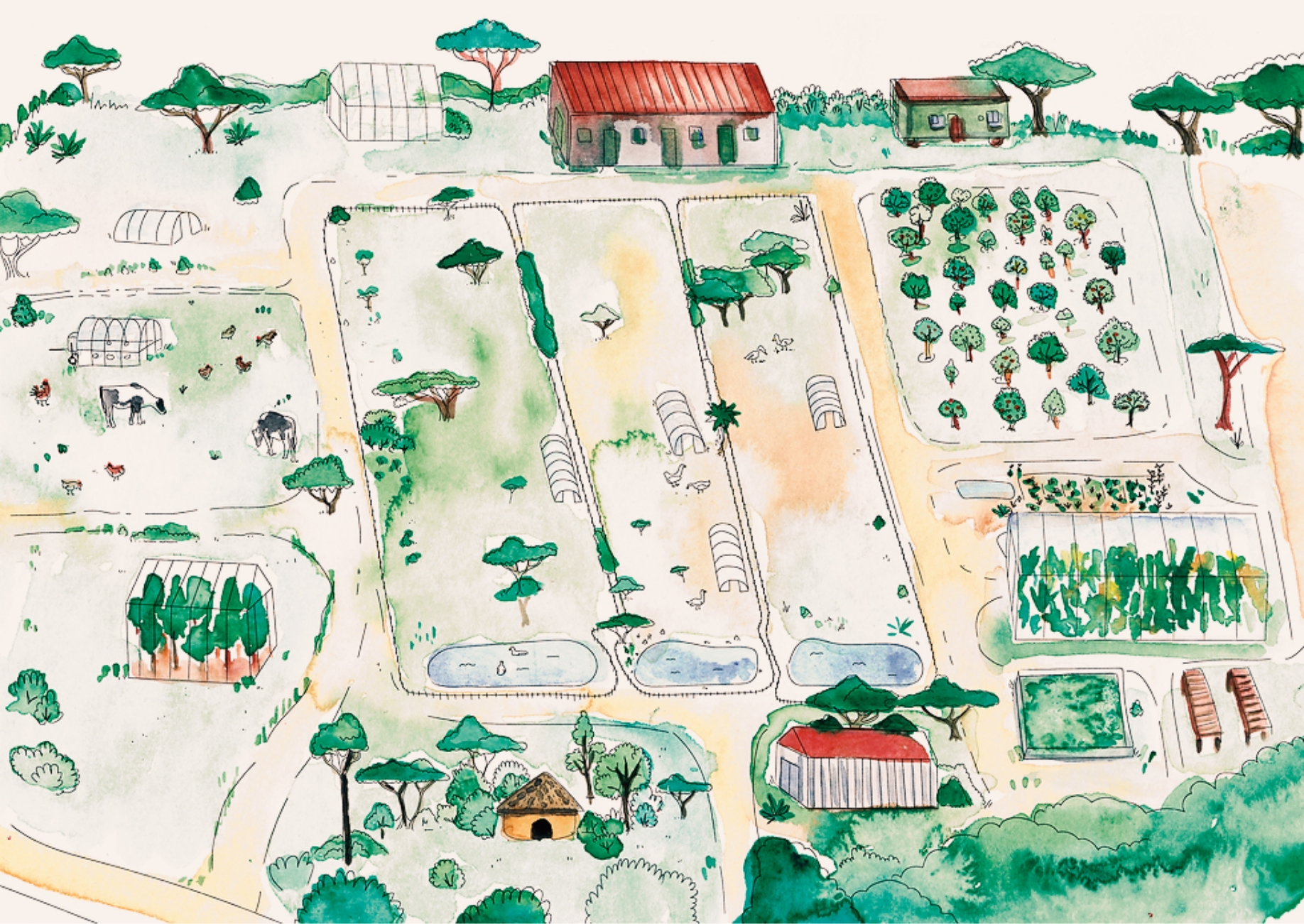
Educating Local Youth
We use the nursery as an education centre; teaching students from our local Oloosirkon school about the importance of a healthy environment. Many of the trees within the nursery were grown by the students, and will go back to their community i. e., school & home for planting.
Growing a Food Forest
Many of the trees within the nursery will be used to provide food for Oloosirkon School, as well as Ololo. By growing food locally and organically, we no longer have to buy in food, reducing transport costs, cycling nutrients and carbon miles.
Offsetting Carbon Emmissions
With our goal of planting 1 tree for every guest that visits Ololo, we aim to offset the emissions produced by our guests travels. To achieve this, we plant a selection of indigenous species that can survive in our local climate.
Our extremely talented craftsmen, or fundis in Swahili, pride themselves on creating quality handmade furniture that add character and charm to any home. We take pride in our unique designs and ensure that each item is built with meticulous attention to detail and overall quality.
Our fundis have made the majority of the furniture you see and use during your Ololo experience.
Some of these pieces are available in the Ololo Shop.
Azolla is a small floating fern that is native to tropical and subtropical regions. Azolla has many valuable uses and is valued for its high protein content, ability to fix atmospheric nitrogen, and use as a feed supplement for our ducks.
Azolla has a symbiotic relationship with a nitrogen-fixing cyanobacterium, which allows it to grow quickly and provide a sustainable source of feed and fertiliser for our farm.
-
Organic Waste Recycling: Worm farms can efficiently convert organic waste like fruit and vegetable scraps, coffee grounds, and eggshells into nutrient-rich compost.
-
Low Maintenance: Worms are easy to care for, and once established, a worm farm requires very little attention.
-
Saves Landfill Space: By diverting organic waste from landfills, worm farms can help reduce the amount of waste that ends up in the landfill, conserving space and reducing the negative impacts on the environment.
Most of what appears on your plate comes directly from our thriving vegetable garden.
What we grow:
Our seasonal produce includes: Button-head and Oyster mushrooms, Thyme, Oregano, Sage, Mint, Basil, Sukuma (Collard Greens), Lemon grass, Rosemary, Kiwi, Lettuce mix, Rocket, Tarragon, Baby Leaf Spinach, Spinach, Eggplant, Celery, Leek, Cabbage, Beetroot, Coriander, Dill, Parsley, Fennel, Onions, Tomatoes, Sorrel, Potatoes, Mustard salad, Okra, Strawberry, Passion fruit, Courgette, Tree tomato, Radish, Garlic, Baby leaf lettuce, Spring onion, Rhubarb and Cucumber.
Most of what appears on your plate comes directly from our thriving vegetable garden.
What we grow:
Our seasonal produce includes: Button-head and Oyster mushrooms, Thyme, Oregano, Sage, Mint, Basil, Sukuma (Collard Greens), Lemon grass, Rosemary, Kiwi, Lettuce mix, Rocket, Tarragon, Baby Leaf Spinach, Spinach, Eggplant, Celery, Leek, Cabbage, Beetroot, Coriander, Dill, Parsley, Fennel, Onions, Tomatoes, Sorrel, Potatoes, Mustard salad, Okra, Strawberry, Passion fruit, Courgette, Tree tomato, Radish, Garlic, Baby leaf lettuce, Spring onion, Rhubarb and Cucumber.
The goal of a chicken processing facility is to produce safe, high-quality chicken products efficiently and professionally. The facilities are subject to strict regulations to ensure food safety and animal welfare.
The hatchery provides a controlled environment for the eggs to develop, including temperature and humidity regulation, until they hatch into baby chickens or ducks.
After a couple of weeks kept safe indoors, they'll head outside to fresh pastures, where they're free to roam, scratch and forage.
All of the milk at Ololo comes from our very own dairy cows. With access milk we also yogurt and our delicious ice-creams!
Our cows graze throughout the day on the farm, and are brought in for milking at 6:30am and 4:30pm every single day.
Come and join us!
Black soldier fly (Hermetia illucens) is used as a sustainable source of animal feed and fertilizer, as well as their ability to efficiently compost and reduce organic waste. The larvae of black soldier flies are high in protein and are fed to our chickens, while their excrement is a rich source of nitrogen and phosphorus, making it a valuable fertilizer. They have a voracious appetite for decaying organic matter, making them useful in the management of waste, as well as providing our chickens with a sustainable, and protein rich diet.
Fresh Eggs for the Ololo kitchen; our eggs are tastier, healthier and more sustainable than any eggs you can find on the supermarket shelves.
Our chickens are free to roam, graze and scratch away, how it should be for all chickens in the world.
We don't use hormones, pesticides or any chemicals to grow our chickens. Instead, they are raised on fresh pastures, fed our delicious black soldier fly, and locked up at night for safety.
Healthy Chickens
Pasture-raised chickens are allowed to forage for food, move around freely, and have access to fresh air and sunlight, resulting in a healthier lifestyle for the birds.
Healthier for us
Pasture-raised chicken has a higher nutrient content, including omega-3 fatty acids, vitamins, and minerals, compared to conventionally raised chicken.
Environmentally Positive
Organic pasture-raised chicken farming practices promote soil health, reduce pollution, and promote biodiversity compared to conventionally raised chicken, which is often raised in crowded and unsanitary conditions.
The following are some benefits of organic free-range duck:
-
Healthier Meat: Ducks that are raised on organic free-range farms are typically fed a diet that is free of artificial additives and pesticides, leading to meat that is healthier and more nutritious.
-
Better Animal Welfare: Organic free-range ducks are able to live in a more natural environment, with access to fresh air, sunlight, and a balanced diet. This can lead to better animal welfare compared to conventionally raised ducks that are often kept in cramped, indoor conditions.
-
More Sustainable Farming: Organic free-range duck farming is typically more environmentally sustainable than conventional farming practices, as it promotes the use of renewable resources and minimizes the use of synthetic chemicals.
-
Environmentally friendly: Organic mushroom farming does not use synthetic chemicals, pesticides or fertilizers, reducing the negative impact on the environment.
-
Health benefits: Organic mushrooms are free from harmful chemicals and contain higher levels of essential vitamins and minerals.
-
Improved soil quality: Organic mushroom cultivation helps improve soil quality through the use of natural methods, such as adding compost and using cover crops.
-
Unique flavors and varieties: Organic mushroom farming offers a wider range of unique and flavorful mushroom varieties compared to conventionally grown mushrooms.
Educating Local Youth
We use the nursery as an education centre; teaching students from our local Oloosirkon school about the importance of a healthy environment. Many of the trees within the nursery were grown by the students, and will go back to their community i. e., school & home for planting.
Growing a Food Forest
Many of the trees within the nursery will be used to provide food for Oloosirkon School, as well as Ololo. By growing food locally and organically, we no longer have to buy in food, reducing transport costs, cycling nutrients and carbon miles.
Offsetting Carbon Emmissions
With our goal of planting 1 tree for every guest that visits Ololo, we aim to offset the emissions produced by our guests travels. To achieve this, we plant a selection of indigenous species that can survive in our local climate.
Our extremely talented craftsmen, or fundis in Swahili, pride themselves on creating quality handmade furniture that add character and charm to any home. We take pride in our unique designs and ensure that each item is built with meticulous attention to detail and overall quality.
Our fundis have made the majority of the furniture you see and use during your Ololo experience.
Some of these pieces are available in the Ololo Shop.
Azolla is a small floating fern that is native to tropical and subtropical regions. Azolla has many valuable uses and is valued for its high protein content, ability to fix atmospheric nitrogen, and use as a feed supplement for our ducks.
Azolla has a symbiotic relationship with a nitrogen-fixing cyanobacterium, which allows it to grow quickly and provide a sustainable source of feed and fertiliser for our farm.
-
Organic Waste Recycling: Worm farms can efficiently convert organic waste like fruit and vegetable scraps, coffee grounds, and eggshells into nutrient-rich compost.
-
Low Maintenance: Worms are easy to care for, and once established, a worm farm requires very little attention.
-
Saves Landfill Space: By diverting organic waste from landfills, worm farms can help reduce the amount of waste that ends up in the landfill, conserving space and reducing the negative impacts on the environment.
Most of what appears on your plate comes directly from our thriving vegetable garden.
What we grow:
Our seasonal produce includes: Button-head and Oyster mushrooms, Thyme, Oregano, Sage, Mint, Basil, Sukuma (Collard Greens), Lemon grass, Rosemary, Kiwi, Lettuce mix, Rocket, Tarragon, Baby Leaf Spinach, Spinach, Eggplant, Celery, Leek, Cabbage, Beetroot, Coriander, Dill, Parsley, Fennel, Onions, Tomatoes, Sorrel, Potatoes, Mustard salad, Okra, Strawberry, Passion fruit, Courgette, Tree tomato, Radish, Garlic, Baby leaf lettuce, Spring onion, Rhubarb and Cucumber.
Most of what appears on your plate comes directly from our thriving vegetable garden.
What we grow:
Our seasonal produce includes: Button-head and Oyster mushrooms, Thyme, Oregano, Sage, Mint, Basil, Sukuma (Collard Greens), Lemon grass, Rosemary, Kiwi, Lettuce mix, Rocket, Tarragon, Baby Leaf Spinach, Spinach, Eggplant, Celery, Leek, Cabbage, Beetroot, Coriander, Dill, Parsley, Fennel, Onions, Tomatoes, Sorrel, Potatoes, Mustard salad, Okra, Strawberry, Passion fruit, Courgette, Tree tomato, Radish, Garlic, Baby leaf lettuce, Spring onion, Rhubarb and Cucumber.
The goal of a chicken processing facility is to produce safe, high-quality chicken products efficiently and professionally. The facilities are subject to strict regulations to ensure food safety and animal welfare.
The hatchery provides a controlled environment for the eggs to develop, including temperature and humidity regulation, until they hatch into baby chickens or ducks.
After a couple of weeks kept safe indoors, they’ll head outside to fresh pastures, where they’re free to roam, scratch and forage.
All of the milk at Ololo comes from our very own dairy cows. With access milk we also yogurt and our delicious ice-creams!
Our cows graze throughout the day on the farm, and are brought in for milking at 6:30am and 4:30pm every single day.
Come and join us!
Black soldier fly (Hermetia illucens) is used as a sustainable source of animal feed and fertilizer, as well as their ability to efficiently compost and reduce organic waste. The larvae of black soldier flies are high in protein and are fed to our chickens, while their excrement is a rich source of nitrogen and phosphorus, making it a valuable fertilizer. They have a voracious appetite for decaying organic matter, making them useful in the management of waste, as well as providing our chickens with a sustainable, and protein rich diet.
Fresh Eggs for the Ololo kitchen; our eggs are tastier, healthier and more sustainable than any eggs you can find on the supermarket shelves.
Our chickens are free to roam, graze and scratch away, how it should be for all chickens in the world.
We don’t use hormones, pesticides or any chemicals to grow our chickens. Instead, they are raised on fresh pastures, fed our delicious black soldier fly, and locked up at night for safety.
Healthy Chickens
Pasture-raised chickens are allowed to forage for food, move around freely, and have access to fresh air and sunlight, resulting in a healthier lifestyle for the birds.
Healthier for us
Pasture-raised chicken has a higher nutrient content, including omega-3 fatty acids, vitamins, and minerals, compared to conventionally raised chicken.
Environmentally Positive
Organic pasture-raised chicken farming practices promote soil health, reduce pollution, and promote biodiversity compared to conventionally raised chicken, which is often raised in crowded and unsanitary conditions.
The following are some benefits of organic free-range duck:
-
Healthier Meat: Ducks that are raised on organic free-range farms are typically fed a diet that is free of artificial additives and pesticides, leading to meat that is healthier and more nutritious.
-
Better Animal Welfare: Organic free-range ducks are able to live in a more natural environment, with access to fresh air, sunlight, and a balanced diet. This can lead to better animal welfare compared to conventionally raised ducks that are often kept in cramped, indoor conditions.
-
More Sustainable Farming: Organic free-range duck farming is typically more environmentally sustainable than conventional farming practices, as it promotes the use of renewable resources and minimizes the use of synthetic chemicals.
-
Environmentally friendly: Organic mushroom farming does not use synthetic chemicals, pesticides or fertilizers, reducing the negative impact on the environment.
-
Health benefits: Organic mushrooms are free from harmful chemicals and contain higher levels of essential vitamins and minerals.
-
Improved soil quality: Organic mushroom cultivation helps improve soil quality through the use of natural methods, such as adding compost and using cover crops.
-
Unique flavors and varieties: Organic mushroom farming offers a wider range of unique and flavorful mushroom varieties compared to conventionally grown mushrooms.
Our seasonal produce includes
- Baby Leaf Lettuce
- Baby Leaf Spinach
- Basil
- Beetroot
- Cabbage
- Celery
- Coriander
- Courgette
- Cucumber
- Dill
- Eggplant
- Fennel
- Garlic
- Kiwi
- Leek
- Lemon Grass
- Lettuce Mix
- Mint
- Mushrooms (Button-Head & Oyster)
- Mustard Salad
- Okra
- Onions
- Oregano
- Parsley
- Passionfruit
- Potatoes
- Radish
- Rhubarb
- Rocket
- Rosemary
- Sage
- Sorrel
- Spinach
- Spring Onion
- Strawberry
- Sukuma (Collard Greens)
- Tarragon
- Thyme
- Tomatoes
- Tree tomato
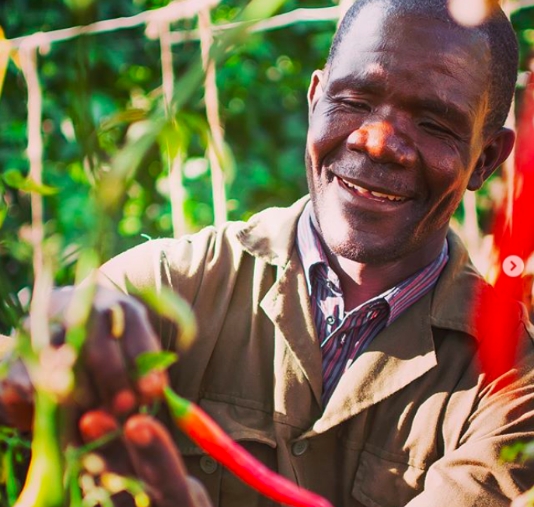
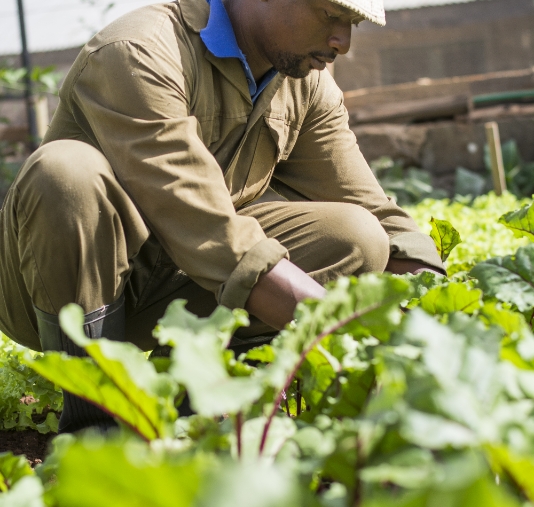
Sustainability
Ololo is proud of its sustainable farming techniques, as well as our water recycling and composting systems.
This includes the production of our natural fertiliser “Ololo Worm Tea” through worm composting.
100% of kitchen and food waste is either fed to the Ololo chickens or composted for use in the gardens.
Our water comes from our bore hole which we share with the local community, as well as filtered for guest’s drinking. A ‘grey water’ recycling and filtration unit treats all waste water that is then used in the Ololo gardens
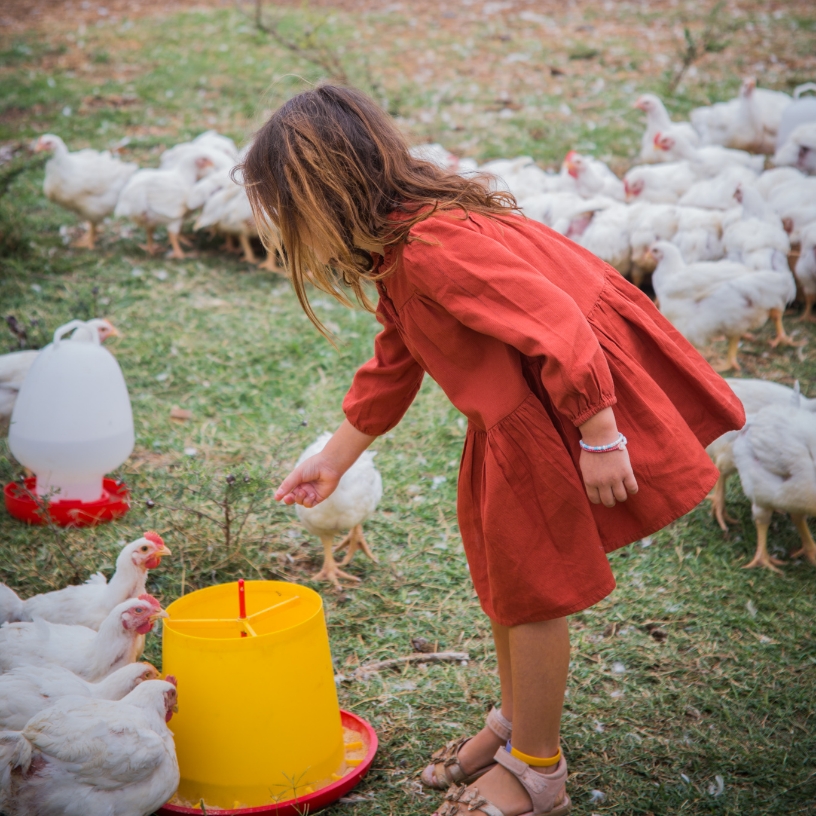
Tour our farm
We’d love to take you on a tour during your visit and you are invited to help collect your breakfast eggs from one of our fat little hens!
| Egg collection daily |
Milking 6:30am and 4:30am daily |


